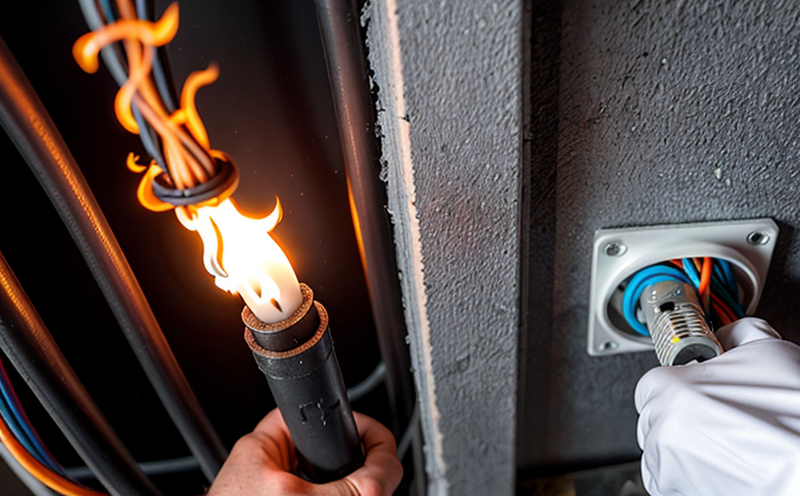Reaction-to-Fire Testing of Flexible Power Cables
The reaction-to-fire testing of flexible power cables is a critical process that ensures the safety and reliability of electrical systems in various applications. This testing evaluates how effectively a cable will perform under fire conditions, focusing on its ability to resist ignition and prevent the spread of flames. The test parameters are designed to simulate real-world scenarios where these cables may be exposed to extreme heat or flame.
The process involves subjecting samples of flexible power cables to controlled fire conditions in accordance with international standards such as UL 1581, IEC 60332-3, and EN 50269. The test apparatus typically includes a cone calorimeter or a furnace designed to replicate the environment where these cables might be used.
During testing, the cable is exposed to ignition sources from both sides, simulating real-world conditions of flame spread. The primary focus is on the cable's behavior under fire exposure, including its ability to maintain structural integrity and electrical continuity while minimizing the risk of fire spread. Key parameters measured include smoke production, heat release rate, and flame spread.
The specimens are prepared by cutting them into standard lengths with specific geometry that ensures consistent testing results. The test conditions must be carefully controlled to ensure reproducibility and comparability with other samples or previous tests. This includes maintaining precise temperature, humidity, and ventilation levels during the test.
After the test, detailed reporting is provided based on the performance of the cable under fire exposure. This report typically includes data on heat release rate, smoke production index, and flame spread rate. These metrics are crucial for assessing the fire resistance properties of the cable and determining its suitability for use in specific applications.
The results of this testing can significantly impact the design and safety features of electrical systems, ensuring compliance with stringent regulations and enhancing overall safety. By identifying potential weak points early in the development process, engineers can make informed decisions to improve product performance and reliability.
Flexible power cables are used in a wide range of applications including industrial machinery, commercial buildings, and residential settings. Ensuring that these cables meet fire resistance standards is essential for preventing fires and minimizing damage. The testing process not only helps manufacturers meet regulatory requirements but also provides valuable insights into the performance of their products under extreme conditions.
Understanding the importance of this testing can help stakeholders appreciate its role in enhancing safety and reliability. It underscores the need for rigorous quality control measures to ensure that all components perform as expected, especially when used in environments where fire risk is a concern.
Why It Matters
The importance of reaction-to-fire testing cannot be overstated. In the event of a fire, the performance of flexible power cables can significantly affect the outcome. These cables are often located in concealed spaces within buildings and machinery, making them difficult to access for repair or replacement during an emergency. Therefore, their ability to resist ignition and prevent the spread of flames is crucial.
- Reduces fire risk: By ensuring that cables can withstand fire exposure without igniting or spreading flames, this testing helps reduce the likelihood of fires starting in electrical systems.
- Safeguards personnel: In commercial and residential settings, flexible power cables are frequently used within walls and ceilings. Ensuring their fire resistance minimizes the risk to personnel in case of a fire outbreak.
- Enhances product reliability: Testing helps identify potential weaknesses early in the development process, allowing for improvements that enhance overall product performance and reliability.
- Safeguards property: By preventing fires from spreading within electrical systems, this testing helps protect valuable assets and infrastructure.
Eurolab Advantages
At Eurolab, we pride ourselves on providing comprehensive and accurate reaction-to-fire testing services for flexible power cables. Our state-of-the-art facilities are equipped with the latest technology to ensure precise and reliable test results.
We utilize internationally recognized standards such as UL 1581, IEC 60332-3, and EN 50269 to conduct our tests. Our experienced technicians have the expertise to prepare specimens according to the required specifications and perform the tests under controlled conditions.
We offer a range of services tailored to meet the specific needs of our clients. Whether you are seeking compliance testing for regulatory requirements or need assistance with product development, we can provide the support you need. Our team works closely with manufacturers and designers to ensure that their products meet the highest safety standards.
Our commitment to quality is reflected in our certifications and accreditations. We are ISO 17025:2017 accredited, ensuring that our testing processes are robust and reliable. This accreditation guarantees that our results are credible and can be trusted by regulatory bodies and clients alike.
We also offer a range of additional services to complement our testing capabilities. These include certification support, training programs for your personnel, and product development assistance. Our goal is to provide you with the tools and expertise necessary to ensure that your products are safe and reliable in all conditions.





